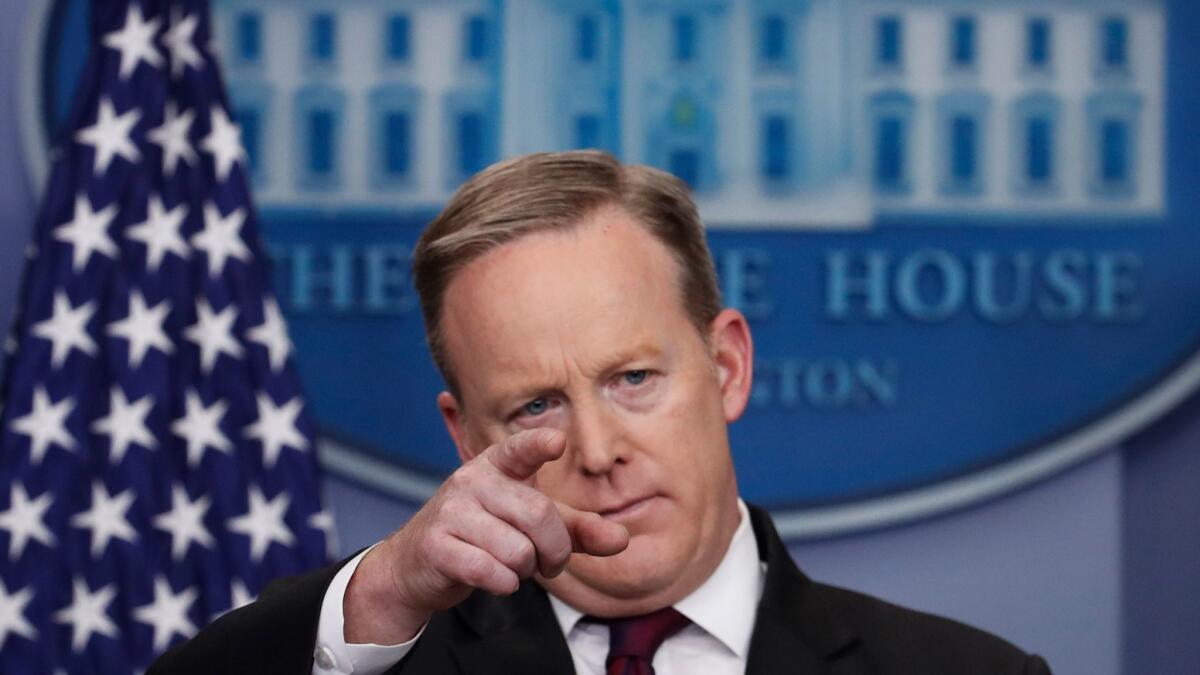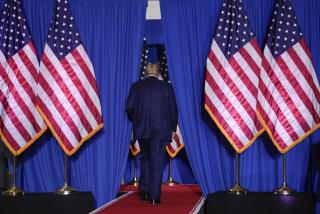Editorial: Trump’s White House press office just put up a velvet rope in front of the media

- Share via
By excluding a number of the country’s largest news outlets from the day’s official White House briefing in favor of friendlier media, Trump administration spokesman Sean Spicer ratcheted up the White House’s war on the free press Friday to a new level. We obviously have a personal stake in this issue — The Times was one of the outlets blackballed, along with CNN, Politico, the New York Times and the BBC — but the episode ought to disturb anyone who believes presidents should be thick-skinned enough to be held accountable by skeptical journalists.
On the one hand, the excluded reporters might feel relieved at having a day off from Spicer’s usual stream of counterfactual spin. This is, after all, the press secretary who began his tenure on a Chico Marx note, telling reporters not to believe what they saw at the inauguration with their own eyes and instead accept the administration’s grossly exaggerated attendance estimates.
The session Friday was less formal one — a “gaggle” in Washington-speak — and it was attended by broadcast and print “pool” reporters whose job was to take notes on behalf of everyone not in the room. And the White House argues that by opening the room to a few extra reporters, it was expanding access, not narrowing it.
That’s the kind of argument Chico Marx would make too.
Ninety minutes before Spicer was scheduled to speak to reporters in the White House briefing room, his office alerted reporters that he would be holding an off-camera session with an “expanded pool.” It then conspicuously excluded reporters from selected news media while allowing in three pool reporters and a hand-picked group of eight others, four of them from right-of-center outlets that have been, shall we say, uncritical of the president (such as Breitbart and the One America News Network). Not to put too fine a point on it, but only one of the five major TV news networks that cover the White House was excluded: CNN, a frequent punching bag of President Trump.
This all happened shortly after Trump took the stage at the Conservative Political Action Conference for a stump speech that began with a salvo against the news media and its use of anonymous sources to bash the White House. (Sample quote: “We are fighting fake news.”)
So what message was the administration sending when Spicer put a velvet rope up outside his office? What could possibly be the rationale for excluding selected White House reporters from an on-the-record session with the White House spokesman in the White House?
If the intent was to intimidate reporters into writing fewer things that the administration does not like, and more things that it does, it is doomed to failure. Bear in mind that the Trump campaign barred several news organizations from attending its events, and that didn’t seem to make a scintilla of difference to their coverage.
Nor can the administration expect to have any more success in controlling the coverage it receives. After all, the easiest and least important part of the job is getting what Spicer was denying to some on Friday: the spin doled out at sessions like the daily briefing. The harder and more vital task is to ferret out what’s really going on behind the scenes that is not disclosed in the press releases and photo opportunities.
And it’s that kind of reporting that has really gotten under Trump’s skin. He has railed against stories leaked to journalists by people within the new administration — anonymous sources that Trump wants the public to believe do not actually exist. Granted, these sources may not get everything right; they’re often pushing their own version of events. But the ones in the Trump administration are hardly fake — they’re just the latest in a long line of government leakers, whistle-blowers and others whose personal agendas don’t line up with their employer’s.
Trump has betrayed some alarmingly authoritarian notions of the presidency over the past two years, and punishing organizations that run stories critical of the president falls right into that category. It also evokes memories of that most famous White House compiler of an enemies list, Richard Nixon — probably not the president whose footsteps Trump wants to follow.
Follow the Opinion section on Twitter @latimesopinion or Facebook
MORE FROM OPINION
Trump voters won. Why should liberals be nice to them?
Bernie Sanders is the leaderless Democrats’ anti-Trump evangelist
Watch what Trump does about the media, not what he says
More to Read
A cure for the common opinion
Get thought-provoking perspectives with our weekly newsletter.
You may occasionally receive promotional content from the Los Angeles Times.










